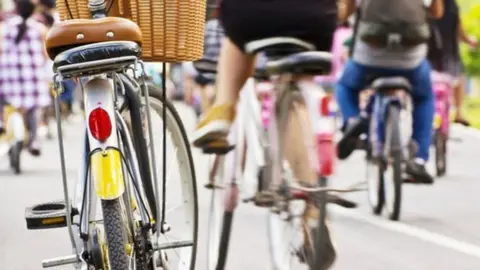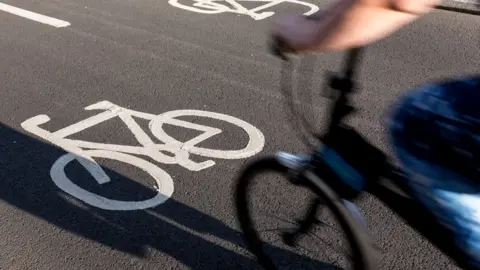Poorly designed cycling projects still funded, says Sustrans
 Thinkstock
ThinkstockMany walking and cycling schemes receive Welsh Government funding despite being poorly designed, according to a cycling charity.
Sustrans is one of a number of groups that gave evidence to AMs on the state of the nation's roads.
The group, which lobbies for and helps build infrastructure, called for funding programmes to be monitored.
The Welsh Government said any scheme it gives money to must comply with its active travel design guidance.
A spokesman said almost £75m had been invested in active travel, including £23m in the last financial year.
"As part of our commitment to continuous improvement that design guidance is currently being updated to reflect the lessons learned to date on active travel schemes," he added.
The economy, infrastructure and skills committee is holding an inquiry into the state of Wales roads.
One of its questions is whether Wales is adopting a sustainable approach to the maintenance and enhancement of its road network.
"Sustrans is of the view that it is too early to comment fully, but early indications predict that this may not be the case," the charities' national director, Steve Brooks, said in evidence to the committee.
AMs passed a law in 2013 - the Active Travel Act - saying councils should provide cycling routes. There has been criticism over its implementation.
"The Active Travel Act has been in existence since 2013 but 2018-19 will be the first year where significant funding for active travel infrastructure has been provided," Mr Books said.
"There still remains no central quality assurance over active travel schemes on the ground in terms of design details and therefore many schemes continue to receive Welsh Government funding despite the fact that they may be poorly designed, or that they utilise older design standards."
 Getty Images
Getty ImagesThe evidence says that short-term single year or end-of-year funding "puts too much pressure on local authorities to deliver schemes without appropriate preparation and effective design".
"Welsh Government funding programmes should be spread over multiple years and monitored effectively to ensure they deliver sustainable and cost effective infrastructure that actively encourages greater use," Mr Brooks added.
A total of £60m is to be spent over three years by the Welsh Government on cycling infrastructure, including new routes.
A Welsh Government spokesperson said: "Since 2015/16 local authorities have been able to bid for multi-year schemes and this decision was taken specifically to enable more complex schemes to progress."
The spokesperson added: "All schemes receiving Welsh Government funding must comply with the Active Travel Design Guidance.
"As part of our commitment to continuous improvement, that design guidance is currently being updated to reflect the lessons learned to date on Active Travel schemes."
Business leaders expressed frustration over the backlog of road repairs and how long it was taking to approve plans for an M4 relief road south of Newport.
A public inquiry's recommendation on the new stretch of motorway is due to be published by early autumn and AMs have been promised a vote on the proposals this year.
Referring to Welsh ministers' preferred black route, and possible other options, Mike Colborne, from haulage firm Owens Group, told the committee: "This M4 relief road, whether it's black, blue, green, purple - whatever one you want it to be - it's been going on for so long now, we're at the point of is it ever going to happen?
"We just seem to be stuck. Or if we're not we're in low first gear, without ever seeing a chance of ever getting into second."
'Piecemeal'
Elgan Morgan, policy and public affairs manager for the South Wales Chamber of Commerce, said: "The history of under-investing in our transport network has not been helping the economy at all.
"If we want an economy that moves forward, that isn't one of the most poor parts of Europe - despite being in a G7 country - then we have to make some transformational changes.
"Doing things piecemeal isn't achieving anything."
Mr Morgan added that the idea of boosting public transport by creating a South Wales Metro was "brilliant", depending on how much it added to the current rail network.
"We fully support the Metro," he said, "but we have a concern that actually all it's going to be is more trains on existing rail.
"Unless you come up with the rest of the network that links into it - more stations and everything - then all you've got is the current system."
